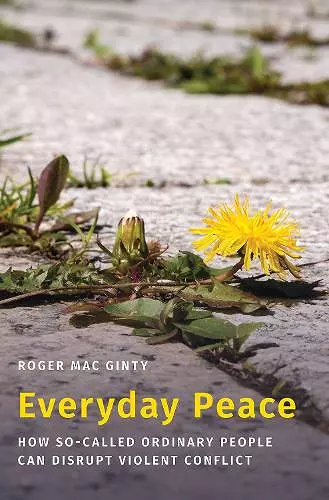Everyday Peace
How So-called Ordinary People Can Disrupt Violent Conflict
Format:Hardback
Publisher:Oxford University Press Inc
Published:20th Oct '21
Currently unavailable, and unfortunately no date known when it will be back

An exploration of how so-called ordinary people can disrupt violent conflict and forge peace. In this pathbreaking book, Roger Mac Ginty explores everyday peace-or how individuals and small groups can eke out spaces of tolerance and conciliation in conflict-ridden societies. Drawing on original material from the Everyday Peace Indicators project, he blends theory and concept-building together with contemporary and comparative examples. Unusual for the disciplines of peace and conflict studies as well as international relations, Everyday Peace also utilizes personal diaries and memoirs from World Wars One and Two. The book unpacks the core components of everyday peace and argues that it is constructed from a mix of sociality, reciprocity, and solidarity. This exploration of bottom-up and community-level approaches to peace challenges the usual concentration on top-down approaches to peace advanced by governments and international organizations. Indeed, the book goes to the lowest level of social organization - individuals, families and small groups of friends and colleagues - and looks at everyday interaction in workplaces, the stairwells of apartment buildings, and the queue for public transport. Mac Ginty sees peace and conflict as being embodied, lived, and experienced - and constructs a multi-layered definition of peace. Importantly, he applies his evidentiary base of micro-acts that constitute everyday peace to societies that have emerged out of conflict and have not experienced recidivism on a large scale. Unlike most who focus on top-down processes, he demonstrates that what matters is the interaction between top-down and bottom-up peace and how, in an ideal scenario, they can have a symbiotic relationship. By focusing on how the small-scale can have big and lasting effects, Everyday Peace will reshape our understanding of how peace comes about.
This book is an important contribution to the peace and conflict literature, particularly in its effort to 'break through the concrete floor'. It is useful for academics in conceptualizing what peace means as well as for practitioners in recognizing early signs of everyday peace. * Louise Ridden, Aberystwyth University, International Peacekeeping *
This book is not an idealistic exercise but rather an invaluable and timely exploration of the often overlooked power inherent in local acts of peace...this book commands the reader to focus on the 'local' in peacebuilding with a precision that guarantees that, moving forward, the everyday cannot be dismissed as irrelevant. * Samantha Gamez, International Affairs *
Everyday Peace is part of a small but important body of literature showing that war is never so totalizing, and that at moments in the passage of a conflict when outsiders see only polarization and stalemate, individuals are doing the vital work of suturing and rebuilding, within sites—the family, the neighborhood—in which power is seldom thought to lie. * Francis Wade, The Nation, The Nation *
Hyper-local peace is just as important as diplomatic, high-level peace, but woefully understudied. Roger MacGinty's fabulous book is likely to become the reference book on everyday peace. It is an innovative, hopeful, and optimistic read, as well as a compelling and sophisticated demonstration that so-called ordinary people have the power to disrupt conflict and forge peace. * Séverine Autesserre, author of Peaceland and The Frontlines of Peace *
Mac Ginty's reflective and empathetic, beautifully written study of 'everyday peace' offers a wealth of experience, wisdom, and evidence. It captures and extensively documents the phenomena of micro-acts of co-existence, long ignored, in the most difficult of circumstances during war. It theorises their impact in disrupting entrenched patterns and norms of violence and conflict, a platform upon which larger scale peace systems and reconciliation may develop. This book cements and extends one of the most significant foundations of—and recent discoveries in—the study of modern peacemaking after war. * Oliver Richmond, Professor of International Relations and Peace and Conflict Studies, the University of Manchester *
Peace is as indispensable as it is elusive, yet as this critically important new book demonstrates, everyday peace can be found in the unlikeliest of places, from the living room to the global battlefield. Combining conceptual sophistication with a keen and sensitive eye for peace practices wherever they may be, Mac Ginty shows how the supposedly ordinary can do the extraordinary by disrupting conflict and creating new and pragmatic possibilities for peace. Setting a compelling new way of seeing and understanding one of the oldest of problems, this book is an essential read for anyone interested in how peace can be built out of war, one that challenges us to rethink old canons and embrace new possibilities. * Alex J. Bellamy, Professor of Peace & Conflict Studies, The University of Queensland *
- Winner of Winner of the 2020-2022 Ernst-Otto Czempiel Award for best book on Peace. Awarded by the Peace Research Institute Frankfurt..
ISBN: 9780197563397
Dimensions: 240mm x 162mm x 23mm
Weight: 531g
272 pages